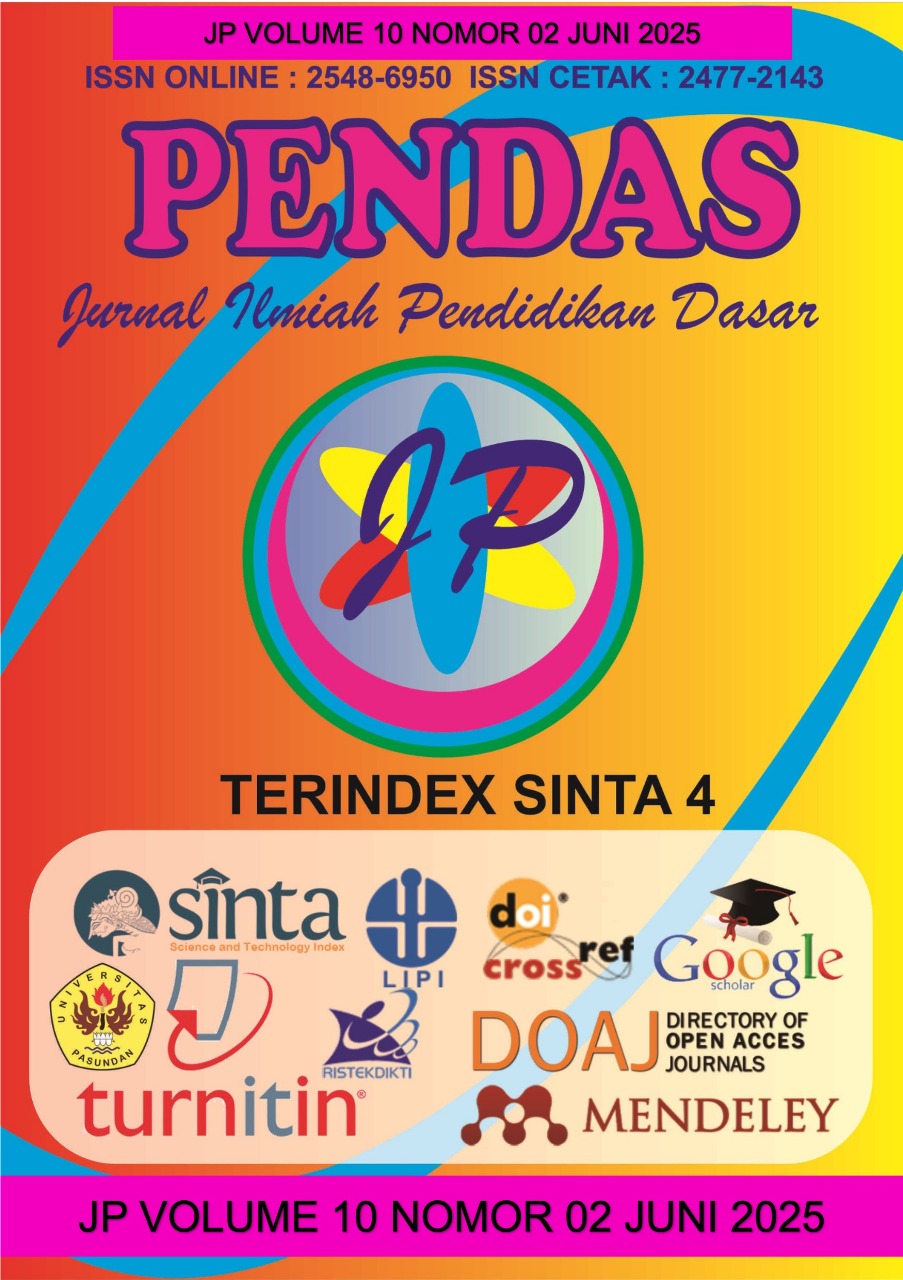STRATEGI GURU DALAM MENGEMBANGKAN MODEL PEMBELAJARAN SOSIAL EMOSIONAL MELALUI PENERAPAN KURIKULUM MERDEKA ANAK USIA DINI DI TK AISYIYAH 1
DOI:
https://doi.org/10.23969/jp.v10i2.25192Keywords:
independent curriculum, early childhood education, social emotional learning, teacher strategiesAbstract
This research aims to describe teachers' strategies in developing a social emotional learning model through the implementation of the Merdeka Curriculum for early childhood at Aisyiyah Kindergarten 1. The approach used is descriptive qualitative with data collection techniques in the form of observation, interviews and documentation. The research results show that teachers at Kindergarten Aisyiyah 1 implement various child-centered learning strategies, such as daily habits, role-playing activities, and small group discussions that encourage children to recognize, manage, and express emotions positively. The Merdeka Curriculum provides flexibility for teachers in designing activities that suit children's social and emotional development needs. In conclusion, the implementation of the Independent Curriculum provides wider space for teachers to integrate social and emotional values into learning contextually and meaningfully
Downloads
References
Booker, J. A., & Dunsmore, J. C. (2017). Affective Social Competence in Adolescence: Current Findings and Future Directions. Social Development, 26(1), 3–20. https://doi.org/10.1111/sode.12193
Chernyshenko, O. S., Kankaraš, M., & Drasgow, F. (2018). Social and emotional skills for student success and well-being. OECD Education Working Papers, 173(January), 1–134.
Denham, S. A. (2007). Dealing with feelings: How children negotiate the worlds of emotions and social relationships. Cognition, Brain, Behavior, 11(1), 1–48.
Denham, S. A., Blair, K. A., Demulder, E., Levitas, J., Sawyer, K., Auerbach-Major, S., & Queenan, P. (2003). Preschool Emotional Competence: Pathway to Social Competence? Child Development, 74(1), 238–256. https://doi.org/10.1111/1467-8624.00533
Education, B. (2003). Toward a Broader Education 1. March, 1–37.
Elliott, S. N., Davies, M. D., Frey, J. R., Gresham, F., & Cooper, G. (2018). Development and initial validation of a social emotional learning assessment for universal screening. Journal of Applied Developmental Psychology, 55(June), 39–51. https://doi.org/10.1016/j.appdev.2017.06.002
Gresham, F., Elliott, S., Metallo, S., Byrd, S., Wilson, E., Erickson, M., Cassidy, K., & Altman, R. (2020). Psychometric Fundamentals of the Social Skills Improvement System: Social–Emotional Learning Edition Rating Forms. Assessment for Effective Intervention, 45(3), 194–209. https://doi.org/10.1177/1534508418808598
Haggerty, K., Elgin, J., & Woolley, A. (2011). Social-Emotional Learning and school climate assessment measures for middle school youth. RAIKES Foundation, 59.
Halberstadt, A. G., Denham, S. A., & Dunsmore, J. C. (2001). Affective social competence. Social Development, 10(1), 79–119. https://doi.org/10.1111/1467-9507.00150
Lee, J., Shapiro, V. B., Robitaille, J. L., & LeBuffe, P. (2024). Gender, racial-ethnic, and socioeconomic disparities in the development of social-emotional competence among elementary school students. Journal of School Psychology, 104. https://doi.org/10.1016/j.jsp.2024.101311
Males, M. (2011). Journal of Applied Developmental Psychology. Journal of Applied Developmental Psychology, 32(3), 160–161.
Mavroveli, S., Petrides, K. V., Rieffe, C., & Bakker, F. (2007). Trait emotional intelligence, psychological well-being and peer-rated social competence in adolescence. British Journal of Developmental Psychology, 25(2), 263–275. https://doi.org/10.1348/026151006X118577
Mckown, C. (2017). Social-Emotional Assessment, Performance, and Standards. 27(1).
McKown, C. (2019). Challenges and Opportunities in the Applied Assessment of Student Social and Emotional Learning. Educational Psychologist, 54(3), 205–221. https://doi.org/10.1080/00461520.2019.1614446
Oberle, E., Schonert-Reichl, K. A., Hertzman, C., & Zumbo, B. D. (2014). Social-emotional competencies make the grade: Predicting academic success in early adolescence. Journal of Applied Developmental Psychology, 35(3), 138–147. https://doi.org/10.1016/j.appdev.2014.02.004
Primi, R., Santos, D., John, O. P., & Fruyt, F. De. (2016). Development of an inventory assessing social and emotional skills in Brazilian youth. European Journal of Psychological Assessment, 32(1), 5–16. https://doi.org/10.1027/1015-5759/a000343
Ross, K. M., & Tolan, P. (2018). Social and Emotional Learning in Adolescence: Testing the CASEL Model in a Normative Sample. Journal of Early Adolescence, 38(8), 1170–1199. https://doi.org/10.1177/0272431617725198
Sullivan, L. (2012). School Psychology. The SAGE Glossary of the Social and Behavioral Sciences. https://doi.org/10.4135/9781412972024.n2261
Zhou, M. (2012). Development and validation of social emotional competency questionnaire. Article in International Journal of Emotional Education, 4(November 2012), 27–42.
Downloads
Published
Issue
Section
License
Copyright (c) 2025 Pendas : Jurnal Ilmiah Pendidikan Dasar

This work is licensed under a Creative Commons Attribution 4.0 International License.














































